Use Menstrual Cups — And Other Ways That Going Green Can Help You Save Money, According To The Freshman’s Carrie Yeo
The singer shares 11 tips from the obvious to the unconventional.
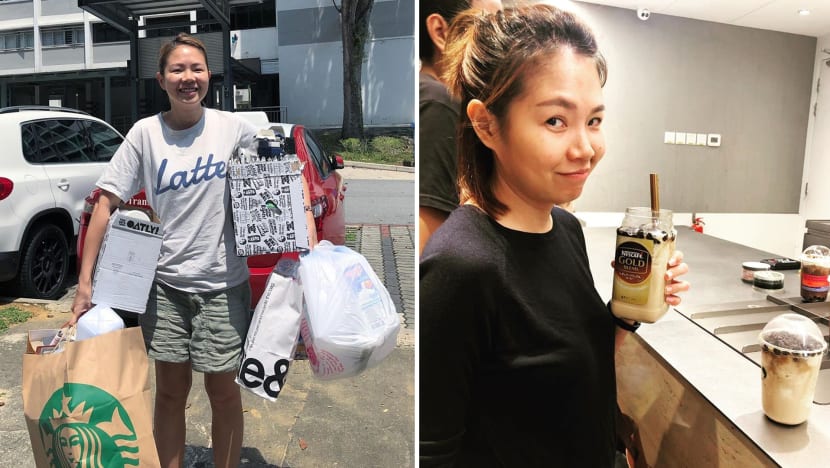
Switching to a more eco-friendly lifestyle might seem daunting, but the truth is, a lot of the changes don’t require much sacrifice and can even save or earn you money. Take it from eco-warrior Carrie Yeo, one-half of local Mandopop duo The Freshman. She started her sustainable living journey two years ago and has been doing her part to bring awareness to waste reduction.
The self-professed karung guni (rag and bone man) doesn’t just walk the talk. She goes beyond the extra mile, and brings food containers and cutlery everywhere she goes, sometimes even for her friends when they dine at hawker centres. Talk about hardcore. To commemorate Earth Day today (April 22), we asked the 38-year-old for tips on how to save money by going green.
Reduce your energy consumption
One of the easiest ways to reduce your carbon foot print is to conserve energy in your home. We all know to opt for energy-efficient appliances, switch off and unplug them when not in use. But if you really want to rack in the savings, boycott your air-conditioner, which according to a 2012 NEA study, accounts for the highest household energy consumption.
“You can really save money if you stop using the air-con every night. What's the point of turning on the air-con and then covering yourself with a thick blanket? Since I stopped using the air-con, I’ve saved around $30 to $40 a month,” says Carrie.
Collect used water in the shower
Did you know the average 10-minute shower consumes 20 litres of water? Think about how much water you save when you take shorter showers AND recycle the used water. And it’s as easy as showering with buckets around you, says Carrie. The water can be used to water the plants, mop the floor, and flush the toilet. “Each time I shower, I collect about two pails of water and it is enough [for my housemate and I to use] for one day.” Speaking of cleaning…
DIY cleaning products using ingredients found in your home.
Make your own cleaning products
Eco-friendly cleaning products often come with a bigger price tag. But, the good news is that they are simple to make and you most likely already have the ingredients in your home. If you are new to DIY, try this simple all-purpose cleaner recipe using citrus peels and vinegar.
All you have to do is fill an air-tight jar with citrus peels and vinegar (it should cover the peels) and let it “ferment” in a dark place. After two weeks, strain the mixture with a sieve, dispose the peels and, voila, you’ve got your all-purpose cleaner. It smells a lot like vinegar, though, warns Carrie, so if you are really averse to the scent, add around 20 drops of your favourite essential oil.
Recycle and get paid
Yes, you can convert trash into cash. There are various recycling programmes in Singapore like Sembcorp’s Ezi’s recycling app, Veolia’s island-wide recycling stations, and reverse vending machines, where you can get paid for recycling. Most accept your usual recyclables like aluminum cans (50 cents per kg), cloth (20 cents per kg), and even small electrical appliances.
Or if you want to do a good deed like Carrie, drop your recyclables off at Tzu Chi’s recycling drives which take place on the second Sunday of each month (temporarily halted due to COVID-19). “There are many locations and they could be at your void deck without you knowing. They sell directly to recycling companies of a particular material and these go directly to the recycling plant. You don’t get cash in return, but Tzu Chi, which is a Buddhist charity organisation, gets it, so in a way you are donating to charity. They have outreach programmes, a youth centre, and also help the elderly,” says Carrie.
Carrie's tapao kit which consists of collapsible containers, cutlery, leak-proof food bag, water bottle, and even a container for sauces.
Ditch single-use products and BYO containers
It may be a hassle to carry food containers and tumblers everywhere you go but your wallet will thank you for it. Not only are you going green by cutting out disposables, some brands and F&B outlets like Starbucks, Botany and Heytea even offer discounts or freebies if you bring your own mug or container. Says Carrie: “Personally, if I do take away, I bring my own container and some shops even offer 25 per cent or 30 per cent off for self-pickups, so you do save quite a bit. I also get 50 cents off when I use my own cup at my favourite bubble tea place Heytea. There’s a BYO Singapore Facebook page that you can follow to find out which outlets offer discount.”
Avoid bottled water — even when you are overseas
“We are so lucky in Singapore ’cos we can turn on any tap and we can just drink from it. But when you are overseas, it is a different story. So I will bring at least two litres of water with me in my luggage when I travel, then ask the hotel to refill my bottles or I will boil water myself. Depends on where I travel, sometimes I also bring a portable filter system so I can filter the tap water before drinking. It’s like an IV bag and can hold around one litre of water. You just fill the bag and you roll it to squeeze the water through the filter, which is like a huge syringe. It’s what people bring out when they go camping so they can collect river water.”
Drop food waste into recycling bins to be turned into fertiliser and potable water.
Don’t waste food waste
Got green thumbs? Instead of spending money on fertiliser, compost your own food waste and turn it into black gold for your soil and garden. But if you don’t have the space to compost, collect your food scraps and drop them off at the red food recycling bins at selected hawker centres and wet markets like Ang Mo Kio Block 628 Market and Tiong Bahru Market where they will be converted into fertiliser and potable water.
“When I cook, I save everything from egg shells to vegetable off-cuts and bones in a container in the fridge and I drop it off at the food recycling bin once a week. It won’t smell if you clear it weekly. Alternatively, you can use your vegetable scraps like carrot peel and cabbage stumps to make stock,” says Carrie.
Go vegetarian and cook at home
“Meat production is one of the three contributors to carbon footprint, so no matter how much plastic you save or electricity you try to conserve, it will not make a bigger impact than going vegetarian or vegan. So a year ago, I decided to go vegetarian and you’ll be surprised how much you can save. For example, a plate of economic rice with two vegetable dishes costs $2.50, but one with meat will be around $4. And after a while, you will realise it is not worth it to buy and eat vegetables outside the home ’cos they cost a lot more, so I most of the time, I end up cooking at home.”
Find creative alternatives to household and personal care products
Most of us don’t think twice about buying items like wet wipes, zipper storage bags and even sanitary napkins. But plenty of products that may already be in our homes can meet our basic needs. You just need to think outside the box. Instead of storage bags, repurpose your old potato chip packaging, suggests Carrie, or use a “make-up eraser cloth” instead of cotton pads.
“I found this make-up eraser, which is a piece of Nano fibre cloth that I use with warm water to remove my make-up. Everything comes off, even waterproof make-up. No make-up remover required. You can also use reusable cotton pads or make your own by cutting up old T-shirts,” says Carrie. “I also use period panties, which are panties with built-in pads, but there are also reusable pads and menstrual cups, which I heard is the best thing ever. If you need to empty the cup, remove it in a handicap toilet, rinse it, and put it back in. So neat and clean.”
KonMari your life and stop shopping
“Consumerism is fun, I get it. It feels good to get the latest gadget or shoes, but you don’t need much to be happy. I rarely buy things, not even second-hand, take hand-me-downs from friends, so I keep wearing the same thing (laughs). I want to be a minimalist so I gave away a lot of clothes, ‘cos I don’t want them to be sitting in my wardrobe and left unworn. I’d rather they go to someone who appreciates them or will wear them.”
Choose products without packaging and buy only what you need.
If you must shop, buy less to save more
Instead of regular supermarkets, shop at zero-waste stores which advocate going packaging free and reducing consumption. You can find everything from shampoo and detergent, to provisions and fruits, and most are sold by weight. “If I want to buy green bean soup, instead of buying one big pack at the supermarket, which I might end up throwing when it expires, I will bring my own container to refilleries and only buy what I need. It may cost more [per gram], but there is less food wastage and no packaging.”
Photos: Carrie Yeo, Fresh Produce Studio, TPGOpen





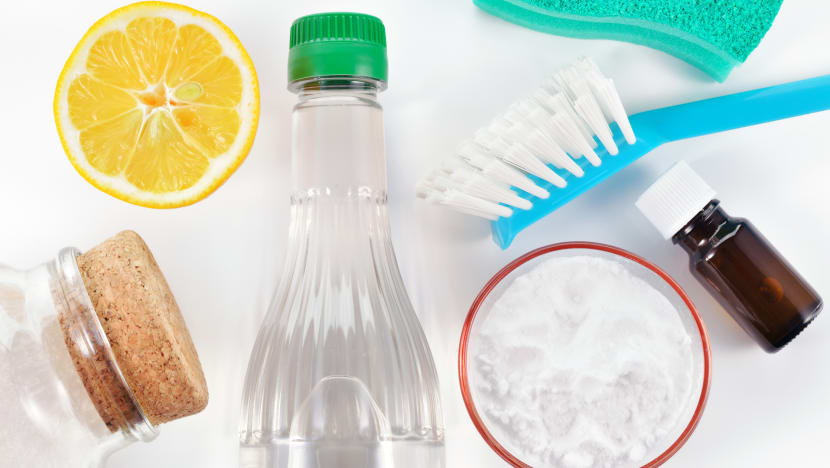
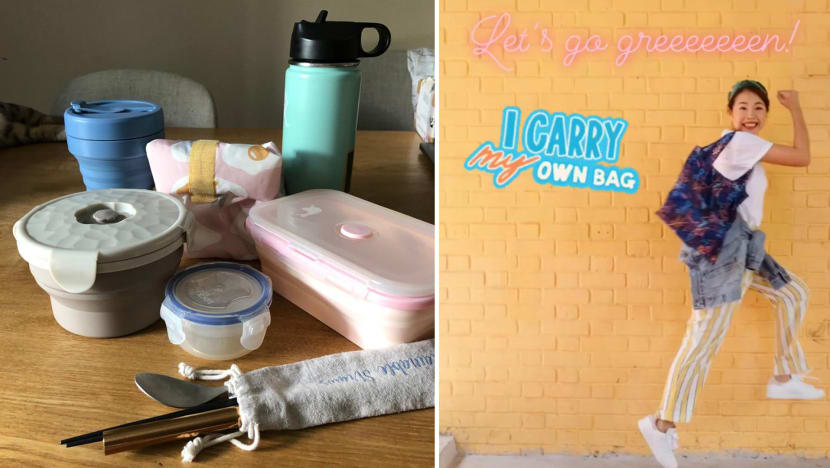
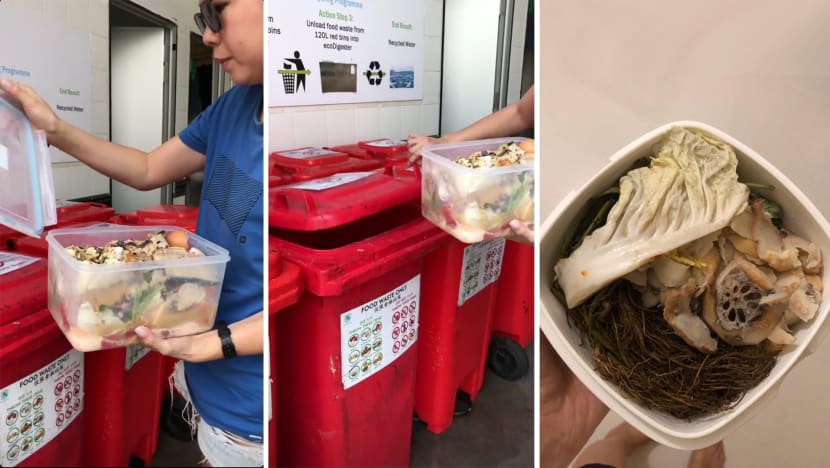
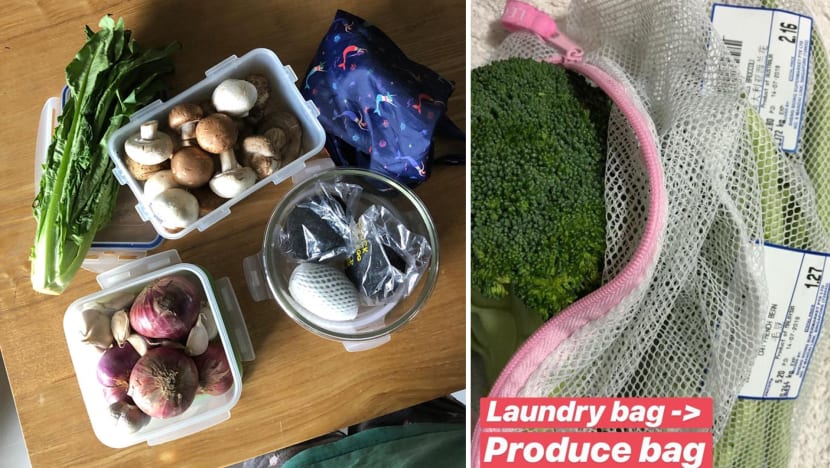





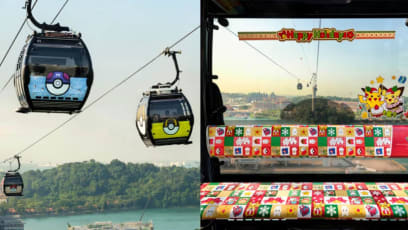



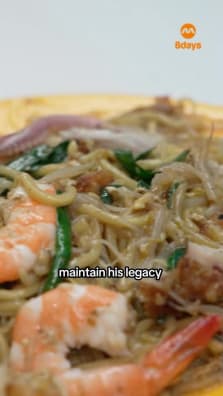


![Boss of Rui Ji chicken rice used to own a tattoo parlour! Talk about a career change! Link in bio to read more
📍Rui Ji Chicken Rice
Blk 93 Toa Payoh Lor 4,
#01-48, S310093
📍148 Beach Road,
#B1-01 The Gateway,
S189720
📍Blk 305 Ubi Ave 1,
#01-179, S440305
[till 16 Apr 2024]
https://tinyurl.com/5dudypkh](https://onecms-res.cloudinary.com/image/upload/s--9s0hbGvI--/c_fit,h_396,w_223/f_auto,q_auto/v1/8days-migration/18015522113203478.jpg?itok=EX3xKSNq)




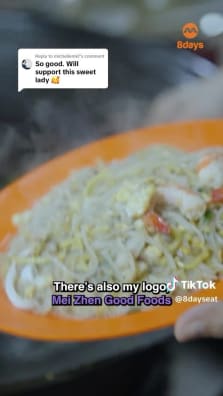

![We stan a kind-hearted boss with a good heart! 💕 Link in bio to read more
📍Rui Ji Chicken Rice
Blk 93 Toa Payoh Lor 4,
#01-48, S310093
📍148 Beach Road,
#B1-01 The Gateway,
S189720
📍Blk 305 Ubi Ave 1,
#01-179, S440305
[till 16 Apr 2024]
https://tinyurl.com/5dudypkh](https://onecms-res.cloudinary.com/image/upload/s---y3eV-Ts--/c_fit,h_396,w_223/f_auto,q_auto/v1/8days-migration/17999638880322602.jpg?itok=Tiqm3SVR)

